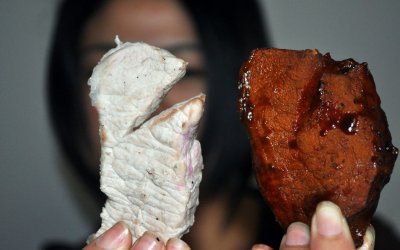New publications
Meat and eggs, it turns out, can be Chinese fakes, too
Last reviewed: 01.07.2025

All iLive content is medically reviewed or fact checked to ensure as much factual accuracy as possible.
We have strict sourcing guidelines and only link to reputable media sites, academic research institutions and, whenever possible, medically peer reviewed studies. Note that the numbers in parentheses ([1], [2], etc.) are clickable links to these studies.
If you feel that any of our content is inaccurate, out-of-date, or otherwise questionable, please select it and press Ctrl + Enter.
Amazing things related to food, writes pharmapractice.ru. Meat and eggs, it turns out, can also be Chinese counterfeit. And in China itself they admit that not all their products are equally useful even for trained athletes.

Dr. Zhou has a mission of national importance. She is investigating which foods are safe for the Chinese national team, which is scheduled to go to the Olympics in London.
"We have already banned them from eating in our restaurants, where the food contains additives that would make it impossible to pass doping control in London," says doctor Zhou He.
One of them is clenbuterol. In small quantities, it is a medicine for asthma. But in China, it is added in huge doses to cattle feed - to gain weight. Following the food chain, it accumulates in the human body, causing not only muscle growth, but also pressure surges and even immune system failure.
"If an athlete eats outside, he must report what and where he ate. You will be surprised, but we will check the restaurant. The reputation of our entire sport depends on it," says doctor Zhou He.
At the previous Games in Beijing, there were already doubts that some Chinese athletes had earned gold medals honestly. Especially when weightlifter Liu Chunhong added not two or five, but ten kilograms to the record of Russian Oksana Slivenko. The results of the Chinese women in the diving competitions were also called unrealistic. Skeptics hinted that either the doping tests were not up to par, or the Chinese ate something that turned them into superheroes.
"We want to beat everyone again in London. Maybe our athletes should also give up other products whose quality leaves much to be desired?" notes nutritionist Ma Zhongren.
The footage from Chinese television shocked the entire country: watermelons began to explode in China - in the fields, like land mines. It turned out that the whole thing was due to new fertilizers.
"I only had low-quality products. But in China we also have fake ones. They are much worse in quality," says farmer Li Kexin.
The pinnacle of China's food know-how is expensive, marbled beef. It is made from cheap pork using a special paste with the addition of the same clenbuterol. There is also rice made from potatoes and polymer resins, fake eggs made from gelatin, benzoic acid, paraffin and gypsum powder. Even in restaurants, counterfeiting is not always noticed.
"I personally prefer to buy imported eggs. It's more reliable. But the labels in the store can also be changed. In general, there is no guarantee," says chef Zheng Tao.
It is not easy to distinguish artificial eggs from natural ones. But it is possible. Firstly, the shell is a little rough to the touch and sometimes shiny. But the main thing is the white and the yolk. After some time, they form a homogeneous mass, since they are made of the same material. But you can only understand this when you break the fake egg.
In China, of course, they are rooting for their team. But this time, concern for the health of the Olympians has caused outrage. "Here we are, amateur football players. What is this? We are now second-class citizens, and no one is stopping us from eating suspicious food?" says amateur football player Bian Shichun.
According to the Chinese, the authorities are not tightening quality control of food products only because they are afraid of food shortages. Feeding one and a half billion people, and doing it well - not a single catering establishment in the world has yet taken on such a task.
